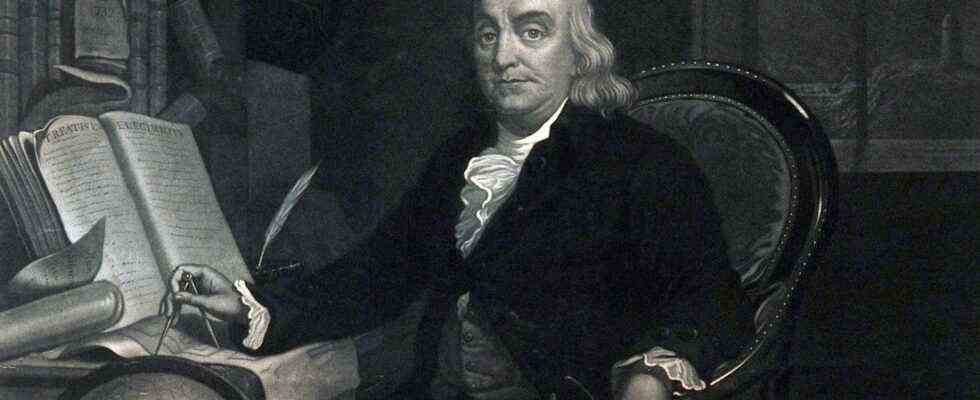She is polite and courteous, attractive and sometimes funny, and as long as you don’t provoke her, she also understands fun. With these words, which sound as if someone was looking for a partner for life in the forgotten love column of old newspapers, the widow Silence Dogood finished her second letter to the editors of the New England Courant. This letter was printed in April 1722. Like 13 other writings that contain much more than the affirmation of their character traits. Editor James Franklin and his journalist colleagues must have been amazed: every night a stranger left these letters under the front door of their printer in Boston, reliably signed with the name Silence Dogood. After reading the first letter, they questioned the author’s name: Only a man can write that brilliantly!
They were not entirely wrong in their assumption. Silence Dogood wasn’t a woman. But not a man either. Silence Dogood was a 16 year old teenager. And the one who invented the lightning rod, who was to sign the American Declaration of Independence 50 years later and was instrumental in ensuring that it came about at all. Silence Dogood was Benjamin Franklin. Ironically, James Franklin’s younger brother and apprentice in his printing house.
The fictional character was three times his age, single and female
After 14 letters, Franklin ran out of ideas and he revealed himself. His revelation surprised the editors, angered his brother, astonished the readers. Silence Dogood was cult, but only briefly mysterious. It is more puzzling why Franklin, at the innocent age of 16, came up with a character who was roughly three times his age, single and female – and whether and how this role-play unmasked or even refuted the image of women in the 18th century in the crown colonies. And anyway: what in God’s name does Silence Dogood mean?
Benjamin Franklin only went to school for a few years and acquired his knowledge self-taught. He read tons of books, including “Essays to do Good” and “Silentiarius” by Cotton Mather, a Boston theologian who Franklin did not take seriously – because he very likely created Silence Dogood, inspired by his book titles. With a wink. Because honestly this name alone provokes the question of what true identity may be hidden behind it.
As Mrs. Dogood, Franklin wrote about conceited Harvard students (“they learn little more than to behave decently and to walk politely into a room – which might as well be learned in a dance school”), the excessive drinking culture in Boston (” What pleasure does the drunkard only look like a person, but behave like an animal? “) And that the poor education among women is the fault of men anyway. Not educating women is the most barbaric custom in the world, wrote Dogood, referring to a quote from the English writer Daniel Defoe. The ignorance of women would not lie in the essence of feminine nature, but would be subject to a male-dominated culture.
He also wrote under the names Anthony Afterwit and Alice Addertongue
With these words in mind, the trail leads to an encounter from Franklin’s youth that can be found in his autobiography. Franklin had a quick-witted friend named Collins, a bookworm like himself. One day the two got into an argument “about the usefulness of educating women in the sciences and their qualifications for study.” Collins believed that higher education was not for women, that they were not up to the intellectual demands. Franklin took the other side, “perhaps just out of the desire to argue.” He was rhetorically intimidated by Collins, he could not express his opinion strongly enough in conversation. So he put it on paper. He wrote a letter that his father got to read. He analyzed the argument and pointed out the weaknesses to his son.
Meanwhile, James Franklin and his colleagues were busy writing articles for the New England Courant. Benjamin wanted too. “But I was still a boy and was afraid that my brother would not want to print any work in his paper that he knew me to be the author,” he says in his biography. Shortly afterwards, the first letters from Silence Dogood were in James’ door.
In the 18th century it was not uncommon for authors to write under pseudonyms. Cover names gave them protection and freedom to express criticism of the state and church, to publish an opinion that deviated from the worldview that they usually represented. Benjamin Franklin made use of it several times in his life. Then there was Caelia Shortface and Martha Careful, Anthony Afterwit, Alice Addertongue, Polly Baker and Richard Saunders, a rather mellow intellectual who occasionally leaked that he thought the ideal role for a woman was in marriage and motherhood, and great Raising men.
For Franklin, pseudonyms were a game, characters for a dialogue with oneself. For him, Silence Dogood was the first voice in a lifelong – and timeless – debate.

